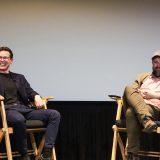So you’re in an MFA program–now what? A guest post by MFA Candidate Ariel N. Banayan
September 17, 2019
Fear and Loathing in an MFA
Before I started the MFA in Creative Writing program at Chapman University, my understanding of an MFA student wasn’t accurate. I imagined stereotypical nerds dropping words like preposterous, obfuscation, pellucidity, and sesquipedalian into day-to-day conversations to prove a point about their fancy craft, whatever that meant. Honestly, I knew craft was important but didn’t really know what is was.
After all, MFA students willingly choose to spend time, money, and brainpower for more schooling after already receiving an undergraduate education. Did they really need it? Was it that special to have another diploma to spell out those creative goals in exactly four words—Master of Fine Arts? Maybe, maybe not. It turns out, the answer for me was a resounding yes.
At first, I was hesitant to dive into the idea of applying for an MFA at all. When talking to friends, relatives, even strangers in the street, I wanted to offer some joke about the very idea of an MFA. But I kept wondering, what if, what if—what if I actually met with people who did this for a living and were willing to help me improve?
Still, other writer’s success stories felt daunting. I saw writers on talk shows, comedians on YouTube, and blog posts that go on and on about writers’ craft and ideas, their fears and failures, all while I hunched over a half-empty bag of Cheetos and an emptier Word document file.
I set the goal to overpower my envy and frustration, not to write, but to try to write. Before joining an MFA program, I had always started to write with the expectation to fail, and things would fall apart to vindicate those beliefs. At Chapman, I now see how the distinction of good, successful writing relies on the effort you place into the process. Being part of this graduate student community at Chapman showed me how my attitude was unstable and explosive, much like hydrogen gas in the Hindenburg waiting for an unexpected spark that would destroy everything.
I had been asking myself questions that revealed more about my insecurities than my own creative intentions: Will they like it? Is it any good? What if someone doesn’t like it? When I entered Chapman’s MFA program, skeptical of myself and hopeful in having the discipline of creative writing passed down onto me like some ceremonial baton, I discovered that everyone else feels that fear of reception, too. It never completely subsides. As part of the MFA program, surrounded by peers who are grappling with similar fears and faculty who are willing to guide us through, I learned to interact with those insecurities that had blocked my way. My peers have lived different lives than I have, have different memories than I do, and love books different from my own tastes, but we’re participating in the writing life together.
Maybe the creative process is an act of navigation, passing between those two pillars of fear and loathing without getting our feathers clipped. My Chapman Experience thus far has taught me how to gauge my creative desires, knowing now that the writing process is a process, not a single attempt.

